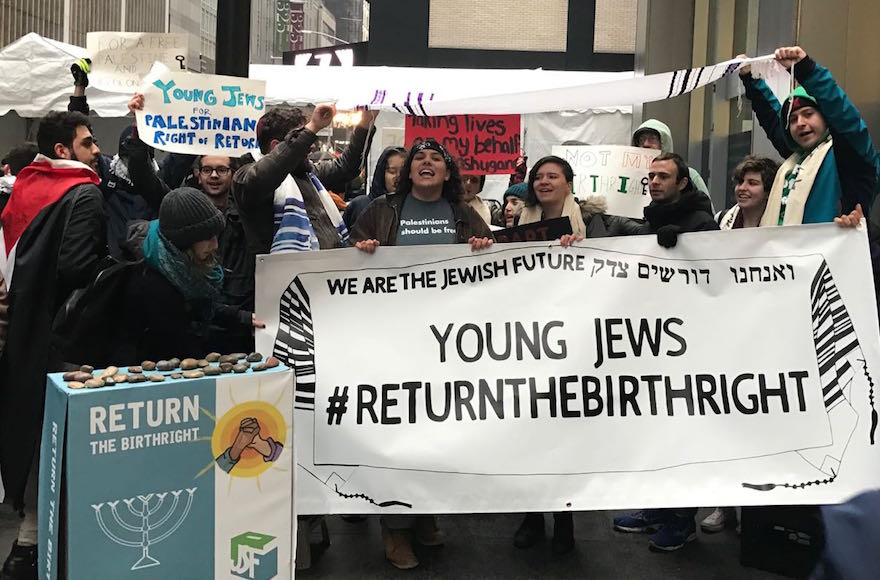Last month, J Street U announced that they will offer a “Let Our People Know” trip to Israel as an alternative to Birthright. As part of their campaign, J Street is asking their members to “only participate in trips that include meetings with both Israelis and Palestinians and that show participants how the occupation impacts the daily lives of Palestinians living beyond the Green Line.”
Similarly, at the beginning of April, several hundred young Jews from the movement IfNotNow gathered at the Birthright headquarters in New York as the most recent escalation in their campaign demanding that Birthright “confront the crisis” of the occupation. Leading up to this action, the group’s demands to Birthright included “show a checkpoint from a Palestinian perspective” and “bring trips to Hebron to see what the policies of the occupation have done to the city.”
It is incredibly exciting to see so many people critical of Birthright and demanding change, but as leaders in Tufts Students for Justice in Palestine, we want to reiterate that the very nature and existence of Birthright is unjust. To offer young Jews free trips to Israel and imply that they have a “birthright” to land occupied by the State of Israel while Palestinian refugees are denied the right to return home is entirely flawed.
It is not enough to ask Birthright to be better. It is instead essential that we reject Birthright all together, focusing instead on building and advocating for collective liberation. We reject the idea that a racist and tokenizing program can fix itself by including one or a few Palestinian voices (carefully vetted, of course, lest they somehow undermine any of the political stances Birthright supports).
The same goes for rigidly structured dialogue about a “conflict” (framed this way, of course, to ignore power imbalances and rewrite the narrative as one of two equal parties) when violence against Palestinians is funded by American tax dollars and Tufts’ investments, and normalized by trips like Birthright.
We must reject Birthright unconditionally and in its entirety, directing our attention and anger towards the right-wing donors that make these trips possible, the corporations that profit off of suffering, and the right-wing governments that enact and fund these oppressive policies.
Since the launch of Jewish Voice for Peace’s “Return the Birthright” campaign in 2017, over 1,000 young Jews have signed a pledge committing to never attend a Birthright trip. For those of us who are eligible to go on Birthright, we must acknowledge that this “birthright” was never ours to begin with, and claiming stolen Indigenous land for an apartheid state cannot be done in our name.
Palestinians have been denied the right to return home for over 70 years, and it is reprehensible for a self-proclaimed “democratic” state to deny this right to 5 million refugees. Hundreds of thousands of Palestinians were forced from their homes in such a hurry that they still have the keys to those doors, and they keep these keys with them as a reminder of their eventual return home. It is so important to hold Israel accountable for its racist policies against Palestinians; when we criticize Israel, it is essential that we center Palestinians who have been telling us for decades about the horrors of occupation. We shouldn’t need to see it for ourselves to believe it – we should trust Palestinians and follow their lead.
In 2005, Palestinian civil society called for people of good conscience around the world to put economic pressure on Israel in protest of their countless human rights violations against Palestinians. This nonviolent movement, known as the Boycott, Divestment, and Sanctions Movement (BDS), is one of the most direct ways that people around the world can support Palestinians, following the legacy of struggle against apartheid in South Africa. The BDS movement asks people around the world to recognize how trips to Israel and the tourism industry are intrinsically linked to state-sanctioned violence.
The group advocating for this movement, known as the Palestinian Campaign for the Academic and Cultural Boycott of Israel (PACBI), recently released a statement titled “Do No Harm: Palestinian Call for Ethical Tourism/Pilgrimage.” This statement argued that it is essential to boycott trips that bring participants to “present-day Israel or illegal Israeli settlements in the occupied Palestinian territory that include any links to the Israeli government or complicit Israeli corporations or institutions.” They call on us, instead, to “increase visits in solidarity with the Palestinian people as well as independent fact-finding missions that have no institutional link of any sort to the Israeli government, complicit institutions or lobby groups.”
The fact that PACBI’s central message in their statement is “do no harm” is very telling: It is essential that we recognize that trips to Israel that do not comply with PACBI’s suggested guidelines will not help Palestinians and other marginalized groups.
Meeting with settlers – colonizers – and contributing to the Israeli economy are only some of the ways in which violence and oppression are normalized and reinforced by trips like Birthright and J Street U’s trip. These trips are actively inflicting harm, and it is important that we recognize that supporting the Palestinian struggle for freedom, justice, and equality requires following Palestinians and their leadership.
Anything short of this is still liberal Zionism and perpetuates the lie that there is a justification for settler colonialism. We must answer the call of more than 250 Palestinian civil society organizations to Boycott, Divest, and Sanction the State of Israel until Palestinians are free.

